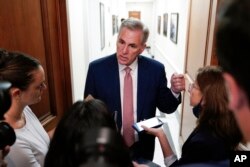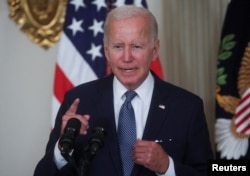President Joe Biden signed a landmark inflation-reducing bill into law on Tuesday as inflation climbs to near 40-year highs. Its title raises an intriguing question. Will this measure actually curb the price spikes that have caused trouble for American households? It has been.
The law, which was approved by Congress last week, does not directly address some of the main drivers of rising prices, from gas and food to rent and restaurant meals.
Still, the law could save some Americans money by reducing the cost of prescription drugs for the elderly, extending health insurance subsidies, and lowering energy prices. There is a nature. It could also modestly reduce the government's budget deficit and slightly lower inflation by the end of the decade. concluded that the impact on next year's inflation would be "negligible". And the University of Pennsylvania's Penn Wharton budget model concludes that "the impact on inflation is statistically indistinguishable from zero" over the next decade.
Such projections, as McCarthy said in his address to the House, suggest that some Republicans, such as House Minority Leader Kevin McCarthy, argue that the bill will "cause inflation."

Biden himself, when referring to the bill's impact on inflation, mentions the possibility of lowering prices for individual categories rather than lowering prices. I'm here. inflation in general. The president said the bill would "reduce prescription drug costs, health insurance premiums and energy costs."
At the same time, the White House promoted a letter signed by more than 120 of his economists, including several Nobel Prize winners and former Treasury Secretary, stating that the legislation would reduce the government's budget deficit. claims. According to the CBO, over the next 10 years he will have $300 billion – “downward pressure on inflation.”
In theory, reducing the deficit would reduce inflation. This is because government spending cuts and tax increases, which help reduce the budget deficit, are pushing down demand in the economy and reducing pressure on businesses to raise prices.
Harvard University economist Jason Furman, who served as chief economic adviser to the Obama administration, wrote in an opinion column for The Wall Street Journal:
But Douglas Holz-Eakin, chief economic adviser to President George W. Bush and later director of the CBO, said that the reduction in the deficit would not take effect until five years from now. Given the size of the economy, it is unlikely to get very large in the next decade.
"A $21 trillion economy making $30 billion a year wouldn't make much of a difference," Holz-Eakin said, referring to estimates of deficit reduction over a decade.
He also notes that Congress has recently passed other laws to subsidize semiconductor production in the United States and expand health care for veterans, and that these laws , said the Inflation Reduction Act would spend more than it saves. said it was possible. This bill would allow him to spend $70 billion over 10 years to expand tax credits so that 13 million Americans can pay for health insurance under the Affordable Care Act. .
These subsidies could free up money for recipients to spend elsewhere and could raise inflation, but the effect is likely to be very small, Smetters said.
This action could lead to savings in medical and energy costs for millions of households, but these items typically represent a relatively small percentage of household budgets. Prescription drugs account for just 1% of US consumer price index spending. Spending on electricity and natural gas is only 3.6%.

$2,000 a year for prescription drugs. This would authorize Medicare to negotiate the cost of some high-priced drugs, a long-standing goal of President Donald Trump. It also limits insulin copayments for Medicare recipients to $35 per month. Insulin prescriptions averaged $54 in 2020, according to the Kaiser Family Foundation.
"This is a historic change," said Lee Purvis, Director of Health Care Expenses at the AARP Public Policy Institute. “This allows Medicare to protect beneficiaries from rising drug prices in a way that has never been done before.”
In 2019, 1.2 million people will be We found that Medicare beneficiaries spend an average of $3,216 on drug prescriptions. Purvis said a recipient using the most expensive drug could spend $10,000 a year or he could spend as much as $15,000.
The law gives Medicare the power to negotiate the price of 10 expensive drugs from next year, but the results won't go into effect until 2026. Up to 60 drugs could be the subject of negotiations by 2029.
{72 Holtz-Eakin argued that while the provision might lower the cost of some Medicare drugs, it would discourage new drug development and reduce new venture capital investment in start-up drug companies.Energy provisions in the Inflation Reduction Act may also generate savings, but the amounts are likely to be much smaller. , but most EVs are exempt because they are required by law to have batteries with U.S.-made materials.
, the law significantly expands the tax credit for homeowners who invest in energy-efficient equipment from a one-time $500 to $1,200 that homeowners can claim annually. Vincent Burns, senior vice president of policy at Alliance to Save Energy, said this will allow homeowners to make new energy-efficient investments for years to come. .
But for all Americans, including those without homes, the impact is likely to be limited. Rhodium Group says that as more Americans drive EVs and as homes become more energy efficient, gas and electricity get cheaper, so by 2030 the bill's provisions will save households an average of up to $112 a year. I estimate it can be done.


